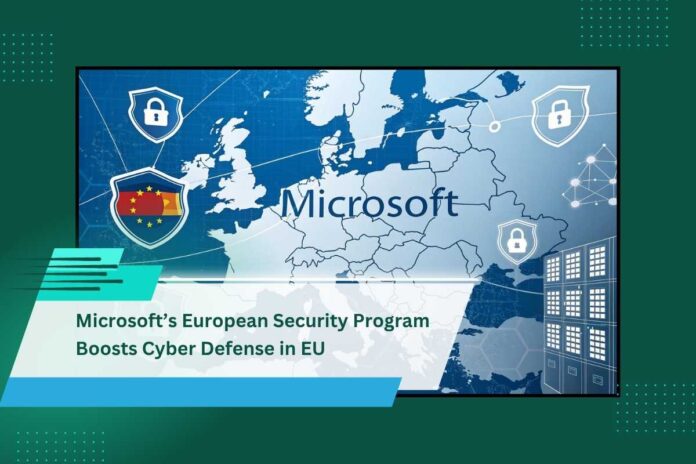In June 2025, Microsoft unveiled its latest strategic initiative: the European Security Program, a bold, multi-faceted approach to help governments across Europe strengthen their digital defenses against a growing wave of cyber threats. As cyberattacks increase in both frequency and sophistication, this new program is designed to offer governments the tools, intelligence, and support they need to protect critical infrastructure, public institutions, and citizen data.
At the heart of the program lies Microsoft’s commitment to partnering with Europe’s public sector to build more secure and resilient digital ecosystems. Through a mix of real-time intelligence sharing, advanced cybersecurity tools, capacity-building initiatives, and compliance guidance, Microsoft’s effort stands as one of the most comprehensive private-sector contributions to European cybersecurity to date.
Why Europe? Why Now?
Europe has become a prime target for cybercriminals and state-sponsored attacks. Hospitals, transportation systems, and public utilities have all faced breaches in recent years. With the increasing reliance on cloud computing, IoT devices, and digital identity systems, the attack surface has expanded rapidly.
Microsoft’s initiative comes as part of a broader recognition that public-private collaboration is essential in today’s threat landscape. No single organization or government can manage the scale of modern cyber threats alone. This program serves as both a response to that reality and a proactive step toward future-proofing Europe’s cyber defenses.
Core Components of the Program
1. Threat Intelligence Sharing
A key element of the European Security Program is a commitment to real-time threat intelligence sharing. Microsoft, through its vast global cybersecurity infrastructure and AI-powered detection systems, collects and analyzes massive amounts of threat data daily. Through this program, European governments will receive curated, actionable insights about:
- Emerging malware and ransomware variants
- Advanced persistent threats (APTs) linked to nation-states
- Indicators of compromise (IOCs) and recommended mitigations
- Sector-specific threats, such as attacks on energy, healthcare, and finance
By offering this intelligence free of charge to governments, Microsoft enables faster, more informed responses to threats.
2. Access to Microsoft Security Technology
The program also includes complimentary or subsidized access to Microsoft’s security stack for eligible public institutions. This includes tools such as:
- Microsoft Sentinel (SIEM and SOAR platform) for detecting and responding to security incidents
- Microsoft Defender for Endpoint and Defender for Identity for protecting against malware, phishing, and identity attacks
- Entra ID (formerly Azure Active Directory) for secure identity and access management
These tools work in unison to give government cybersecurity teams a comprehensive defense and monitoring solution, integrated with the cloud and protected by AI.
3. Cybersecurity Training and Capacity Building
Cybersecurity is not just about technology—it’s about people. A critical aspect of the program is developing talent and equipping public servants with the knowledge to identify, manage, and respond to cyber threats.
Microsoft is expanding access to:
- Hands-on labs and simulation-based exercises
- Online certifications (like Microsoft SC-series certifications)
- Executive workshops for decision-makers on cybersecurity strategy
- Train-the-trainer programs to scale knowledge across agencies
With a cybersecurity skills gap affecting nearly every European country, this focus on education is crucial.
4. Regulatory Support and Compliance Alignment
Europe’s data protection and cybersecurity regulations are among the most rigorous in the world. Between the GDPR, NIS2 Directive, and upcoming European Cybersecurity Act, public institutions face a complex compliance landscape.
Microsoft’s program includes a dedicated advisory layer to help organizations understand, align with, and maintain compliance with:
- GDPR data protection requirements
- EU cloud security certification schemes
- National cybersecurity strategies and sector-specific mandates
Tools like Compliance Manager and Secure Score, included in Microsoft 365, also offer risk-based guidance and automated policy checks.
5. National Cloud and Data Residency Options
Microsoft has invested heavily in expanding its European datacenter footprint. With sovereign cloud capabilities and dedicated national cloud regions, Microsoft ensures that European data remains in Europe.
This aligns with many European governments’ digital sovereignty goals and provides enhanced data residency, control, and regulatory assurance.
The European Security Program will leverage these local infrastructure investments to guarantee that sensitive government data is both secure and locally stored.
A Model for Private-Public Cyber Partnership
What sets Microsoft’s approach apart is its focus on sustainable, collaborative security. Rather than a one-off donation of tools or a temporary program, this initiative is designed to be an evolving platform that grows with the needs of European nations.
Microsoft has committed to forming country-specific security partnerships in multiple EU member states. These partnerships will include regular briefings, shared security operations centers (SOC collaboration), and joint incident response exercises.
The company is also advocating for increased cybersecurity coordination between EU institutions and tech providers. The goal is to foster a European cyber ecosystem that is:
- Interconnected across borders
- Built on shared standards and protocols
- Ready to defend against both cybercrime and geopolitical cyber aggression
Response from European Leaders
Early reactions to the initiative have been largely positive. European cybersecurity agencies and policy leaders have praised the program as a timely and necessary investment.
In several countries, Microsoft is already working with CERTs (Computer Emergency Response Teams) and government digital agencies to onboard them into the program. In Brussels, the initiative is seen as aligned with the EU’s broader digital resilience goals, including those outlined in the Digital Europe Programme and the Cyber Solidarity Act.
Cybersecurity experts also see the program as a potential blueprint for other global tech firms to follow. By proactively investing in the public good, Microsoft is demonstrating that trust and security are central to long-term digital transformation.


